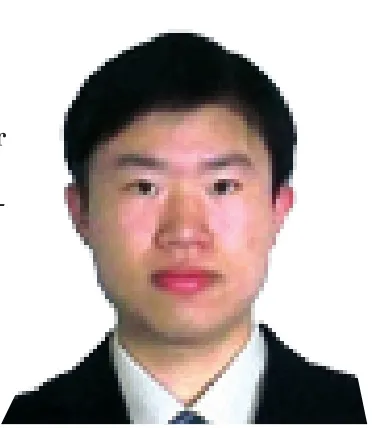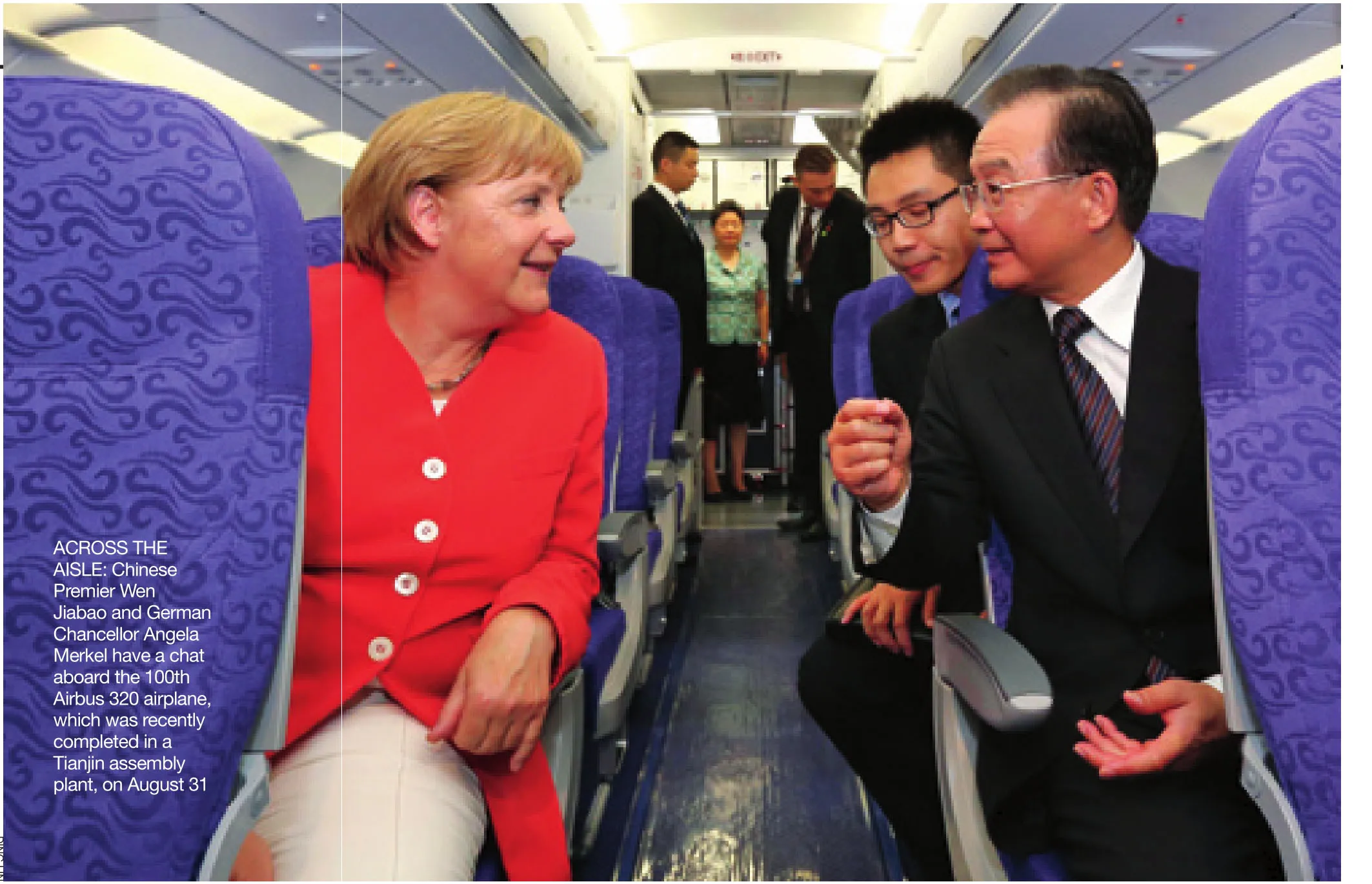Seeking Mutuality With Merkel
2012-10-14GermanchancellorsecondBeijingtripthisyearboostsSinoGermanrelationsByLiChao
German chancellor’s second Beijing trip this year boosts Sino-German relations By Li Chao
Seeking Mutuality With Merkel
German chancellor’s second Beijing trip this year boosts Sino-German relations By Li Chao

The author is a researcher with the China Institutes of Contemporary International Relations

DiNG LiN
German Chancellor Angela Merkel wrapped up a two-day Beijing trip on August 31. It was her second visit to China this year and sixth overall as German chancellor. Also, it was the third time this year that Merkel had met with her Chinese counterpart, Premier Wen Jiabao. The frequency and intensity of meetings between these heads of government within such a short time highlights the vital position of the two in each other’s foreign strategies.
The visit, during which the second round of Sino-German governmental consultations was held, was of a significantly large scale and high level with a broad range of issues. Consisting of seven ministers, two state secretaries and about 20 business leaders from major enterprises including Siemens, Volkswagen, BASF, Thyssen Krupp and the European Aeronautic Defense and Space Co., Merkel’s most recent delegation to China was the largest in history. While she was in China, Merkel held talks with top Chinese officials including President Hu Jintao and Premier Wen.
Substantial achievement
Before Merkel left for Beijing, German officials for the first time described Sino-German relations as a “special relationship” in a media briefing, implying the bilateral relationship has reached a new height. The term had previously been used by Germany only among its Western allies.
Germany is an export-oriented economy. However, as Europe continues to grapple with its debt crisis while the U.S. economic recovery stutters, Germany is in an awkward situation where its traditional external market is shrinking. In contrast, China, as the world’s second largest economy, provides big market potential for German manufacturers. In Germany’s new foreign policy guidelines released in February, the German Government declared to focus its foreign affairs on relations with emerging countries. In the meantime, the ruling alliance has also modified its Asia policy as of late. The Sino-German relationship has become Germany’s top foreign policy priority, which is most evident by the three meetings between Merkel and Wen in one year.
The two countries have continued to strengthen bilateral economic cooperation, widely seen as the generator and stabilizer of these relations. The two sides signed 13 cooperation agreements in various fields during Merkel’s visit, and Chinese and German enterprises inked commercial contracts worth nearly $7 billion. The contracts are of great symbolic significance for Germany, which faces problems such as an austere external environment and economic slowdown. The deals will play a positive role in boosting the German economy and promoting German exports. Moreover, the contracts involve industries that China is interested in, such as electric vehicles, biotechnology and environmental protection, sectors where there is ample opportunity for the two countries to seek win-win cooperation.
The ongoing dispute between Chinese and European solar photovoltaic companies did not constitute any barrier for the dialogue. Germany’s SolarWorld filed a complaint seeking import tariffs on Chinese-made solar products in July. If investigation on the case begins, it will become the largest trade dispute of Chinese enterprises with foreign companies in terms of total sum. Thanks to the high political trust and a maturing dispute settlement mechanism, the two sides agreed to resolve the anti-dumping issue through dialogue rather than by resorting to anti-dumping proceedings.
Merkel’s trip also aimed to show China that Europe is determined and capable in solving the debt crisis. In September, the Federal Constitutional Court of Germany will bring in a verdict on the constitutional feasibility of the European Stability Mechanism, the euro zone’s permanent rescue fund. And the European Commission, the European Central Bank as well as the IMF will also give an appraisal report on the status of Greece’s fiscal deficit reduction. In a sense, the European debt crisis is at a crucial juncture. Therefore, the German chancellor is expecting China to play a positive role in helping to confront the crisis.
Besides expressing wishes for China to purchase more euro-zone bonds, Merkel stressed Europe has the ability to overcome the crisis and the crisis even might promote the integration of Europe. She hopes the outside world will regain confidence in Europe and provide a stable and positive external environment for recovery. Chinese leaders have offered a positive response to Merkel’s concern. Wen said China is willing to continue investing in euro-zone government bonds as long as it can gain assurance that risks are under control. China has confidence in the European economy, the euro zone and the euro, he said.
As the two countries overcame setbacks caused by Merkel’s meeting with the Dalai Lama in 2007, Sino-German relations have experienced sound development, especially in the past two years. The personal friendship between leaders of the two countries also carries on smoothly, laying a solid foundation for comprehensive interaction in the future. Since China faces a leadership transition in the coming months, this might be the last time for Wen to receive Merkel as Chinese premier. During their interactions in recent years, the two leaders have developed a close personal friendship. When Wen visited Germany in April, Merkel accompanied him for the entire trip as they visited the Hanover trade fair and the headquarters of Volkswagen. This time, Wen accompanied Merkel to his hometown of Tianjin, creating another memorable visit for the German chancellor. In addition, Merkel met with younger leaders such as Vice President Xi Jinping and Vice Premier Li Keqiang, which will help to create favorable conditions for future bilateral communication.
New cooperation fields
China and Germany have the potential to complement each other in clean and renewable energy. Germany has a technical advantage while China’s labor cost is relatively competitive
The economies of China and Germany are highly complementary. Besides their traditional economic cooperation in heavy industry, the two could explore other fields that are mutually beneficial. Judging from the achievements of the most recent round of consultations, the two sides are likely to conduct extensive cooperation in several new areas.
After the Fukushima nuclear accident in Japan in 2011, Germany initiated a green energy strategy and decided to close all nuclear power stations in the country by 2022. Germany will then turn to solar, wind and biological energy as a substitute. Meanwhile, it is moving to make a breakthrough in electric vehicles. As green energy is an inevitable trend of the future, China has also increased input in the field in recent years and made much progress. For instance, China’s highefficiency storage battery technology was well received in the German market. However, competition among enterprises in the two countries is also emerging. As solar energy products made in China have price advantages, they met with trade protectionism in Germany. In fact, China and Germany have the potential to complement each other in clean and renewable energy. Germany has a technical advantage while China’s labor cost is relatively competitive. The large demand for new energy products in China also provides German products with a huge potential market. The two sides might also pursue cooperation in environmental protection, high technology transfer as well as energy security.
Cultural exchanges, as a supplement of political and economic relations, play a vital role in deepening mutual friendship and promoting nongovernmental ties. Cultural exchanges between the countries have become more and more frequent in recent years. The three-year-long “Germany and China—Move Ahead Together” campaign from 2007 to 2010 bolstered mutual understanding between the two cultures. It also helped to push forward cooperation in urban planning, transportation, infrastructure construction, energy saving, cultural facility improvement and more.
This year marks the 40th anniversary of the establishment of diplomatic relations between the two countries. The Chinese Culture Year in Germany, inaugurated at the very beginning of 2012, gives German people a chance to participate in diverse Chinese cultural activities and take a truthful and lively look at China up close. The cultural activities have substantially increased people-topeople interaction, which will pave the way for bilateral political and economic cooperation. What’s more, cultural exchanges are not merely limited to the folk level. There is vast room in science, education, healthcare and art for the two to learn from each other. Highlevel cooperation in those fields would break the traditional mode of cooperation and lend new vitality to bilateral relations.
